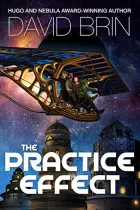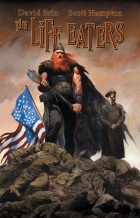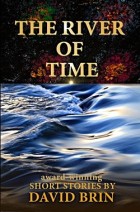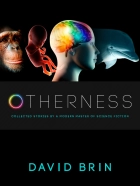First and foremost. The biggest news in online art and visual media is the resurrection of Patrick Farley’s Electric Sheep  Comix site. This brilliant… and cosmically under-rated … visual artist and innovative storyteller is back! You can view the dramatic and politically cogent “Spiders” saga, which I cite regularly for its implications about citizen-centered civilization… or view the psychedelic future in the sci fi “Don’t Look Back“… finally grasp the full implications of the terrifyingly bizarre fixation called the Book of Revelation, in “Apocamon“…
Comix site. This brilliant… and cosmically under-rated … visual artist and innovative storyteller is back! You can view the dramatic and politically cogent “Spiders” saga, which I cite regularly for its implications about citizen-centered civilization… or view the psychedelic future in the sci fi “Don’t Look Back“… finally grasp the full implications of the terrifyingly bizarre fixation called the Book of Revelation, in “Apocamon“…
Or scroll through the stunningly beautiful, thought-provoking… and sexy… newest Farley work… “First Word.” And I may have a very special Farley-related announcement soon!
==More on Fantasy and SF==
I enjoyed the guest essay, A Far Green Country, that fantasy Author Catheryn Valente contributed to Charlie Stross’s blog. I found many of her insights and metaphors fascinating and fun, such as why magic realism as a sub-genre seems to crop up especially in countries ruled by brutal despotisms.
 Nor is magical thinking solely the province of non-technological minds. I agree that the nerdy-techno “singularity” is – at root – just a modern manifestation of magical-transcendentalism. Indeed, our 21st Century America is awash in mystics! The technological illiterates among them either wallow in the Book of Revelations or lefty-Gaian nostalgism or else solipsistic AynRandianism, Those who are tech-empowered shift their transcendentalism to what’s been called the “rapture of the nerds.” Same stuff though, when you dig deep to the level of personality, and thousands of years old.
Nor is magical thinking solely the province of non-technological minds. I agree that the nerdy-techno “singularity” is – at root – just a modern manifestation of magical-transcendentalism. Indeed, our 21st Century America is awash in mystics! The technological illiterates among them either wallow in the Book of Revelations or lefty-Gaian nostalgism or else solipsistic AynRandianism, Those who are tech-empowered shift their transcendentalism to what’s been called the “rapture of the nerds.” Same stuff though, when you dig deep to the level of personality, and thousands of years old.
I found the anecdote about Cotton Mather and obsession with the Rapture erudite, hilarious, persuasive and rather moving!
Still, in the end, I found Cat’s missive troubling. We all know there IS a difference and distinction between Fantasy and SF. Simply pointing the finger at some sci fi and saying “that’s also magical thinking!” is not a truly helpful step toward understanding. Cat knows very well that there is a lot of science fiction that explores the processes of change in human civilization, thought and nature without pleading a transcendent dispensation or rapture.
 No, the root element is right there in that word “change.” Science fiction borrows many elements from the mother genre – fantasy — elements of boldness and the fantastic that date back to Homer & Gilgamesh. But sci fi then rebels against all literary foundations by embracing change. Even when it warns against BAD change it is relishing, exulting, expanding upon what Einstein called the “gedankenexperiment” or thought experiment.
No, the root element is right there in that word “change.” Science fiction borrows many elements from the mother genre – fantasy — elements of boldness and the fantastic that date back to Homer & Gilgamesh. But sci fi then rebels against all literary foundations by embracing change. Even when it warns against BAD change it is relishing, exulting, expanding upon what Einstein called the “gedankenexperiment” or thought experiment.
When SciFi goes “whatif” it takes the sacred word seriously.
 Fantasy is almost perfectly encapsulated by the presumption of changelessness. Oh, kingly rulers my topple and shift, but the abiding assumptions and social castes generally do not. This is why, despite her dragons and bards and medieval crafts, Anne McCaffrey proclaimed loudly that “I am a science fiction writer!” Because her characters know that change is coming. Some resist, many are eager to bring it on as fast as they can. And the future on Pern will have both dragons and flush toilets. Songs and tapestries and universities and hyperdrive ships.
Fantasy is almost perfectly encapsulated by the presumption of changelessness. Oh, kingly rulers my topple and shift, but the abiding assumptions and social castes generally do not. This is why, despite her dragons and bards and medieval crafts, Anne McCaffrey proclaimed loudly that “I am a science fiction writer!” Because her characters know that change is coming. Some resist, many are eager to bring it on as fast as they can. And the future on Pern will have both dragons and flush toilets. Songs and tapestries and universities and hyperdrive ships.
 Terry Pratchett writes science fiction because his discworld (borne through space by a mythical turtle) has something called progress. People are waking, rising up. George Martin’s depressing Game of Thrones saga has very little magic in it, but it consigns the peasants to endless, endless, endless misery and feudal oppression, with absolutely no hope of progress. It is part of the longer/older tradition stretching back to Homer. It is fantasy.
Terry Pratchett writes science fiction because his discworld (borne through space by a mythical turtle) has something called progress. People are waking, rising up. George Martin’s depressing Game of Thrones saga has very little magic in it, but it consigns the peasants to endless, endless, endless misery and feudal oppression, with absolutely no hope of progress. It is part of the longer/older tradition stretching back to Homer. It is fantasy.
I go into this elsewhere in my essay, The Difference between Science Fiction and Fantasy.
But other than that…terrific article. Thanks Cat, I learned a lot. I must look up your books.
== And Miscellaneous Cool Stuff! ==
Watch this segment of Neil deGrasse Tyson about America’s decline amid the changing landscape of modern science. I mean it. Watch this and make your uncles and cousins watch it. Half of our economic growth since WWII came from science and technology. This last decade was the first in 60 years in which the US did not stun the world with some terrific “new thing” that let us get rich enough to then buy megatons of crap from foreign factory workers and uplift a new world middle class. The Fox War on Science is nothing less than pure, unadulterated treason.
No more Virtual reality headsets or helmets: DARPA is developing megapixel augmented reality contact lenses that will allow users to focus on both faraway objects and images placed very close to the eye. I portray this in EXISTENCE.
Too pretty for words. Gorgeous planets in drops of water.
Comedian — Dara O’Briain — opines on science and quackery. Brilliant, utterly brilliant: “The difference is that science knows it doesn’t know everything. If it thought it knew everything it would stop.”
Some of us, including fellow author John Shirley, used to muse about the possibility of using a plasma blaster to turn trash into component atoms–a trash DISINTEGRATOR. It’s apparently energy efficient and could solve many environmental problems.
What exactly are your online rights? What protections are offered under the First Amendment and intellectual property laws? Chilling Effects offers an extensive database of info about copyright and trademark infringement, fan fiction, cease and desist notices, issues of anonymity and freedom of expression. A joint project of the Electronic Frontier Foundation and Law Schools at Harvard, Stanford, Berkeley and the George Washington School of Law, Chilling Effects is a first stop to determine your legal rights in the on hot issues in the ever-evolving online world. I’ve been known to differ over matters of emphasis with my friends at EFF. I am far less worried about what governments and the mighty “see” about me — and history shows little hope of stopping them — while I am more vexed and angry over government and the mighty hiding from citizen supervision. Still this is a good and important move and I am glad these folks are doing things like this!
Former PA Senator and Presidential candidate Rick Santorum is at least no hypocrite. He is up-front about the anti-intellectualism that has become a central theme in the Republican Party. Watch this clip of Santorum telling people to stop donating to colleges because college indoctrinates kids against religion. (Don’t most Ivy league schools have a seminary?) Well, in fact, a college education doesn’t eliminate faith. It does, however, tend to decrease confidence that the Earth is 6000 years old. And the percent who watch Fox does steeply decline.
 If you think wealth is concentrated in the United States, just wait till you look at the data on campaign spending. In the 2010 election cycle, 26,783 individuals (or slightly less than one in ten thousand Americans) each contributed more than $10,000 to federal political campaigns. Combined, these donors spent $774 million. That’s 24.3% of the total from individuals to politicians, parties, PACs, and independent expenditure groups. Together, they would fill only two-thirds of the 41,222 seats at Nationals Park the baseball field two miles from the U.S. Capitol. When it comes to politics, they are The One Percent of the One Percent.
If you think wealth is concentrated in the United States, just wait till you look at the data on campaign spending. In the 2010 election cycle, 26,783 individuals (or slightly less than one in ten thousand Americans) each contributed more than $10,000 to federal political campaigns. Combined, these donors spent $774 million. That’s 24.3% of the total from individuals to politicians, parties, PACs, and independent expenditure groups. Together, they would fill only two-thirds of the 41,222 seats at Nationals Park the baseball field two miles from the U.S. Capitol. When it comes to politics, they are The One Percent of the One Percent.
A Sunlight Foundation examination of data from the Federal Election Commission reveals a growing dependence of candidates and political parties on the One Percent of the One Percent, resulting in a political system that could be disproportionately influenced by donors in a handful of wealthy enclaves. (And remember, this is just the up-top data and does not include Super Pacs!)
One percent of one percent… that is about the ratio of nobility in feudal societies. welcome back to the human normal. The Enlightenment was cool while it lasted, hm?














Fiction books are made as a means of escaping reality and allowing readers to somehow enjoy. I am a fan of this kind of books, since they make me relax.
Uncertainty is a truly uncomfortable feeling for most people, i think, while some folks enjoy the feeling. I figure it’s similar to adrenaline junkies and such, who enjoy the feeling of falling (in various methods). So yeah, fantasy, with it’s certainties and mostly straight forward struggles is popular. What’s amazing to me is how, at times, a culture can go and embrace change and the idea of progress. Not sure how such a time can be induced or encouraged.
David it is very disappointing that you are willing to disparage both the Singularity and people who appreciate the intellectual worth of it. Here is my response: http://singularity-utopia.blogspot.com/2012/02/david-brins-singularity-denigration.html
To my mind, the difference is that sci-fi has some element of plausibility to it, however speculative or far-fetched. The distinction may be fuzzy and hard to define exactly but there’s a difference between advanced science and tech vs. waving a wand.
And to me, that difference is important. Because sci-fi puts constraints on the characters in their pursuits in a way that’s more interesting than just pure magic. Yes, the Enterprise goes faster than light and that may well be impossible, thus magical. But when the starship Voyager found itself on the other side of the galaxy somebody did the math and figured it would take several decades to get back. Not the same as clicking your heels to get back to Kansas.